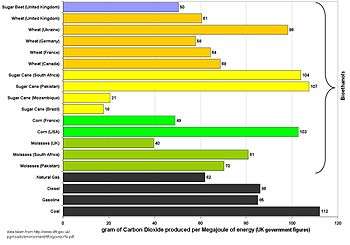Renewable Transport Fuel Obligation

The Renewable Transport Fuel Obligation (RTFO) in the United Kingdom is a requirement on transport fuel suppliers to ensure that 5 percent of all road vehicle fuel is supplied is from sustainable renewable sources by 2010. The Government intends to set variable targets for the level of carbon and sustainability performance expected from all transport fuel suppliers claiming certificates for biofuels in the early years of the RTFO.[1][2]
The announcement to introduce the Obligation was made on 10 November 2005,[3] using powers included in the Energy Act 2004. It came into force on 15 April 2008.[4] In mid-2005, biofuel made up 0.25% of overall road fuel sales, around 50% of it imported.[5]
In practice, the Renewable Transport Fuel Obligation will mostly be achieved by blending bioethanol, biomethanol, biodiesel and biogas (derived from sources such as palm oil, oilseed rape, cereals, sugar cane, sugar beet, and reprocessed vegetable oil) with fossil fuels. Almost all existing vehicles are able to run on a 5% blend in liquid fuels or on 100% biogas, although in some cases fuel system adjustment may be needed. Consideration should also be given to the effect of biofuel constituents on fuel system parts such as rubber hoses, particularly in older or classic vehicles. Flexible Fuel Vehicles, currently more common in the Americas than in Europe, are able to use blends of up to 85% ethanol in the U.S. and Canada, and up to 100% hydrous ethanol in Brazil.
The requirement that the biofuel sources should be sustainable is also important. In South America and Asia, the production of biofuels for export has in some cases resulted in significant ecological damage, including the clearing of rainforest.
In the future, the Department for Transport estimate that up to 1/3 of the fuel in the UK transport sector could be produced from home-grown biofuels. In addition to contributing to cutting carbon emissions, the use of biofuels is seen as widening the country's fuel diversity and increasing fuel security.
The RTFO will help bring the UK into line with European Union biofuels directive, which sets targets for all EU countries for biofuel usage of 2% by the end of 2005 and 5.75% by the end of 2010.
Implementation
The RTFO will be implemented through a certification scheme administered by the Department for Transport. Companies certified as having sold more than the 5% obligation will be able to sell their certificates for the excess to those who sold less.
See also
- Biodiesel in the United Kingdom
- Climate change
- Energy use and conservation in the United Kingdom
- Energy policy of the United Kingdom
- Hybrid vehicle
- Peak oil
- Low-carbon fuel standard
References
- 1 2 "Carbon and Sustainability Reporting Within the Renewable Transport Fuel Obligation" (PDF). Department of Transport, United Kingdom. January 2008. Archived from the original (PDF) on 25 March 2009. Retrieved 25 April 2009.
- ↑ "Renewable Transport Fuel Obligation: frequently asked questions". UK Department of Transport (DfT). Archived from the original on 7 September 2008. Retrieved 25 April 2009.
- ↑ http://www.gnn.gov.uk/environment/fullDetail.asp?ReleaseID=177217&NewsAreaID=2
- ↑ http://www.opsi.gov.uk/si/si2007/uksi_20073072_en_2#pt2
- ↑ http://www.biodiesel.co.uk/biofuels_breakthrough.htm
External links
- Department for Transport/RTFO
- Text of the Renewable Transport Fuel Obligations Order 2007 from the Office of Public Sector Information
- Department for Transport Renewable Transport Fuel Obligation feasibility report
- BioenergyWiki page on the RTFO
- Critique of Government biofuels policy
In the media
- 26 July 2006, The Guardian Biofuels fires up its Teesside production
- 2 November 2005, The Times, All cars will run on 'biofuel' mix by 2010
- May 2002, European Environmental Bureau, Biofuels not as green as they sound
- 23 November 2004, Feeding Cars, Not People, George Monbiot